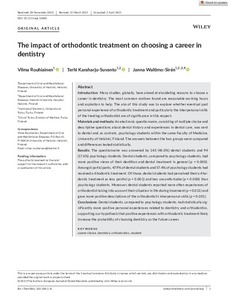The impact of orthodontic treatment on choosing a career in dentistry
Rouhiainen Vilma; Karaharju-Suvanto Terhi; Waltimo-Sirén Janna
The impact of orthodontic treatment on choosing a career in dentistry
Rouhiainen Vilma
Karaharju-Suvanto Terhi
Waltimo-Sirén Janna
WILEY
Julkaisun pysyvä osoite on:
https://urn.fi/URN:NBN:fi-fe2021093048232
https://urn.fi/URN:NBN:fi-fe2021093048232
Tiivistelmä
Introduction Many studies, globally, have aimed at elucidating reasons to choose a career in dentistry. The most common motives found are reasonable working hours and aspiration to help. The aim of this study was to explore whether eventual past personal experience of orthodontic treatment and particularly the interpersonal skills of the treating orthodontist are of significance in this respect.Materials and methods An electronic questionnaire, consisting of multiple choice and descriptive questions about dental history and experiences in dental care, was sent to dental and, as controls, psychology students within the same Faculty of Medicine, University of Helsinki, Finland. The answers between the two groups were compared and differences tested statistically.Results The questionnaire was answered by 143 (46.0%) dental students and 94 (17.6%) psychology students. Dental students, compared to psychology students, had more positive views of their dentition and dental treatment in general (p = 0.000). Amongst participants, 47.9% of dental students and 57.4% of psychology students had received orthodontic treatment. Of those, dental students had perceived their orthodontic treatment as less painful (p = 0.001) and less uncomfortable (p = 0.000) than psychology students. Moreover, dental students reported more often experiences of orthodontist taking into account their situation in life during treatment (p = 0.011) and gave more positive descriptions of the orthodontist's interpersonal skills (p = 0.031).Conclusions Dental students, compared to psychology students, had statistically significantly more positive personal experiences related to dentistry and orthodontics, supporting our hypothesis that positive experiences with orthodontic treatment likely increase the probability of choosing dentistry as the future career.
Kokoelmat
- Rinnakkaistallenteet [27094]
